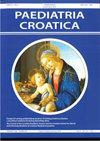Dojenje u izvanrednim situacijama s osvrtom na nedavne humanitarne krize i pandemiju virusa Covid-19
Q4 Medicine
引用次数: 0
Abstract
The world is becoming a place where the number of emergencies and humanitarian crises is increasing rapidly due to economic inequality and the gap between developed and underdeveloped countries, as well as climate changes leading to disruption of the natural balance and development of natural disasters. The most vulnerable groups of the population including women and children always are aff ected by disasters. The younger the child, the more vulnerable he/she is, especially if not naturally fed or having a mother or parents. Various humanitarian organizations have been involved in a number of crises, with the World Health Organization and UNICEF and other United Nations-related organizations leading the way. In the care of mothers, infants and young children, most important is to ensure appropriate nutrition because otherwise it can result in life-threatening health conditions. The lack of protection, support and promotion of natural nutrition (breastfeeding) and its disruption and undermining by uncritical and uncontrolled donations and distribution of infant formula are the biggest challenge due to the l ack of information of mothers, those who provide support in emergencies from both governmental and non-governmental sector, without cross-sectoral cooperation, thus causing uncoordinated and sometimes harmful interventions. Therefore, it is recommended that governments issue guidelines on infant and young child nutrition prior to the occurrence of an emergency, and crisis management regulations in which the issue of infant and young child nutrition will be given due consideration.在最近的人道主义危机和新冠肺炎大流行的特殊情况下服用
由于经济不平等和发达国家与不发达国家之间的差距,以及气候变化导致自然平衡的破坏和自然灾害的发展,世界正成为一个紧急情况和人道主义危机数量迅速增加的地方。人口中最脆弱的群体,包括妇女和儿童,总是受到灾害的影响。孩子越小,他/她就越脆弱,尤其是如果没有自然喂养或有母亲或父母的话。各种人道主义组织都卷入了一些危机,世界卫生组织、儿童基金会和其他与联合国有关的组织起了带头作用。在照顾母亲、婴儿和幼儿时,最重要的是确保适当的营养,否则会导致危及生命的健康状况。缺乏对自然营养(母乳喂养)的保护、支持和促进,以及婴儿配方奶粉的不加批判和不受控制的捐赠和分发对其造成的破坏和破坏,是最大的挑战,因为母亲的信息匮乏,那些在紧急情况下提供支持的母亲来自政府和非政府部门,没有跨部门合作,从而造成不协调、有时甚至有害的干预。因此,建议各国政府在紧急情况发生前发布婴幼儿营养指南,以及适当考虑婴幼儿营养问题的危机管理条例。
本文章由计算机程序翻译,如有差异,请以英文原文为准。
求助全文
约1分钟内获得全文
求助全文
来源期刊

Paediatria Croatica
医学-小儿科
CiteScore
0.20
自引率
0.00%
发文量
0
审稿时长
6-12 weeks
期刊介绍:
In the inaugural 1956 issue of the journal, the editor Dr Feđa Fischer Sartorius outlined the journal''s vision and objectives saying that the journal will publish original papers on the development, pathology, and health care of children from the prenatal period to their final biological, emotional and social maturity. The journal continues this vision by publishing original research articles, clinical and laboratory observations, case reports and reviews of medical progress in pediatrics and child health.
 求助内容:
求助内容: 应助结果提醒方式:
应助结果提醒方式:


